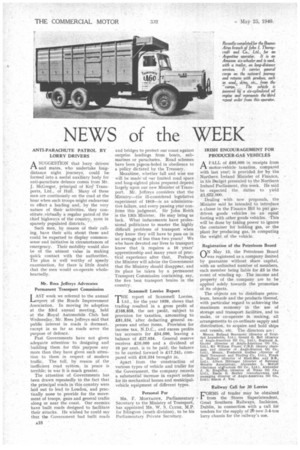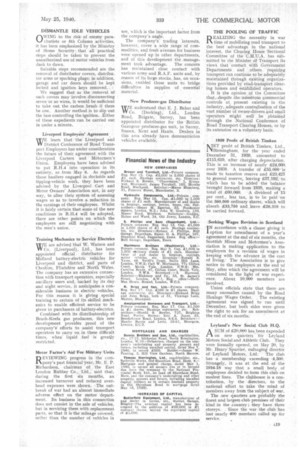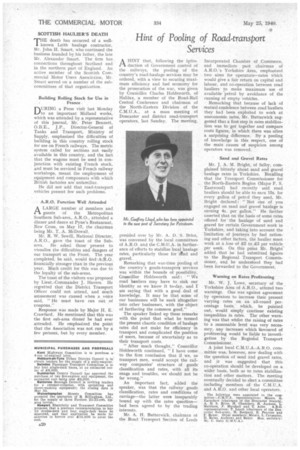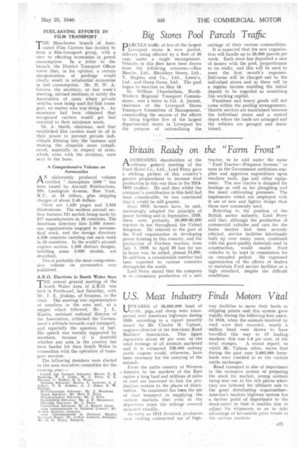NEWS of the WEEK
Page 20

Page 21

Page 22

Page 23

If you've noticed an error in this article please click here to report it so we can fix it.
ANTI-PARACHUTE PATROL BY LORRY DRIVERS
ASUGGESTION that lorry drivers and mates, who undertake longdistance night journeys, could be formed into a useful auxiliary body for anti-parachute defence comes from Mr. J. McGregor, principal of Ke? Transports, Ltd., of Hull. Many of these men are continously on the road at the hour when such troops might endeavour to effect a landing and, by the very nature of their activities, they constitute,virtually a regular patrol of the chief highways of the country, even in sparsely populated districts.
Such men, by reason of their calling, have their wits about them and could be expected to display commonsense and initiative in circumstances of emergency. Their mobility would also be of the utmost value in making quick contact with the authorities. The plan is well worthy of speedy examination, for there is little doubt that the men would co-operate wholeheartedly.
Mr. Rees Jeffreys Advocates Permanent Transport Commission
LAST week we referred to the annual Lareport of the Roads Improvement Association. • In moving its adoption at the 53rd annual meeting, held at the .Royal Automobile Club last Wednesday, Mr. Rees Jeffreys said that public interest in roads is dormant, except in so far as roads serve the purpose of defence.
Past Governments have not given adequate attention to designing and building them for this purpose any more than they have given such attention to them in respect of modern traffic. The toll, by reason of the inefficient road system, in peace is terrible; in war it is much greater.
The attention of Governments has been drawn repeatedly to the fact that the principal roads in this country were laid out to lead to London., and practically none to provide for the movement of troops, guns and general traffic along or near the coast. Our enemies have built roads designed to facilitate their attacks. He wished he could say that the Government had built roads and bridges to protect our coast against surprise landings from boats, submarines or parachutes. Road schemes have been pigeon-holed in obedience to a policy dictated by the Treasury.
Meantime, whether full and wise use will be made of our limited road space and long-sighted plans prepared depend largely upon our new Minister of Transport. Mr. Jeffreys considers that the Ministry—the ill-considered legislative experiment of 1919—is an administrative failure, and every passing year confirms this judgment. Sir John Reith is the 13th Minister. He may bring us luck. What inducements have professional politicians to master the highly difficult problems of transport when they know they will have to pass on in an average of less than two years? We who have devoted our lives to transport know that it requires a 10 years' apprenticeship and many years of practical experience after that. Perhaps the Minister will advise the Government that the Ministry should disappear, and its place be taken by a permanent Transport Commission containing, say, the five best transport brains in the country.
Scammell Lorries Report
THE report of Scammell Lorries, Ltd., for the year 1939, shows that trading resulted in a gross profit of 2168,858, the net psofit, subject to provision for taxation, amounting to £61,534, after deducting general expenses and other items. Provision for income tax, N.D.C., and excess profits tax accounts for £54,500, leaving a balance of £27,034. General reserve receives £10,000 and a dividend of 10 per cent, is to be paid; the balance to be carried forward is £17,241, compared with £16,334 brought in.
Apart from the construction of various types of vehicle and trailer for the Government, the company records a substantial increase in export orders for its mechanical horses and municipalvehicle equipment of different types.
Personal Par
MR. F. MONTAGUE, Parliamentary Secretary to the Ministry of Transport, has appointed Mn. W. S. CLUSE, M.P. for Islington (south division), to be his Parliamentary Private Secretary. IRISH ENCOURAGEMENT FOR• PRODUCER-GAS VEHICLES AFALL of £65,000 in receipts from motor-vehicle taxation, compared with last year, is provided for by the Northern Ireland Minister of Finance, in his Budget presented to the Northern Ireland Parliament, this week. He said he expected the, duties to yield £1,652,000. Dealing with new proposals, the Minister said he intended to introduce a clause in the Finance Bill to put gasdriven goods vehicles on an equal footing with other goods vehicles. This will be done by taking power to ignore the container for holding gas, or the plant for producing gas, in computing the weight of the vehicle.
Registration of the Petroleum Board
ON May 13, the Petroleum Board was registered as a company limited by guarantee without share capital, with an unlimited number of members, each member being liable for £5 in the event of winding up.The income and property of the company are to be . applied solely towards the promotion of its objects.
The objects are to distribute petroleum, benzole and the products thereof, with particular regard to achieving the maximum economy in the use of storage and transport facilities, and to make, or co-operate in making, all arrangements to co-ordinate supply and distribution, to acquire and hold ships and vessels, etc. The directors are :
Messrs. Rolland Beaumont (director of Trin)dad Leaseholder Ltd.), Gerald G. Bell (director of Anglo-American Oil Ca.. Ltd.), Reginald A. Carder (director of Anglo-American Oil Co., Ltd.), Sir William Fraser, C.B.E. (deputy chairman and director of Anglo-Iranian Oil Co.. Ltd.), Messrs. Frederick Godber 'director of Shell Transport and Trading Co., Ltd.), Frank L. Halford (director of Shell-Max and BB., Ltd.), Albert Ilittinger (director of National Benzole Association), Alexander L. McColl (chairman of gyacnum Oil Co, Ltd.), Alexander J. N. SingleTon (director of Texas Oil Co., Ltd.), Emile E. Soubry Ivice-chairman and managing director of Anglo-American Oil Co., Ltd.); Simon J. Yes.
Railway Call for 20 Lorries
FOEMS of tender may be obtained from the Stores Superintendent, Great Southern Railways, Inchicore, Dublin, in connection with a call for tenders for the supply of 215 new 3-4-ton lorry chassis for the railway's use.
DISMANTLE IDLE VEHICLES
nWING to the risk of enemy para chutists or 5th Column activities, it has been emphasized by the Ministry of Home Security: that all practical steps should be taken to prevent the unauthorized use of motor vehicles from dusk to dawn.
Suitable steps recommended arc the removal of distributor covers, distribUtor arms or sparking plugs: in addition, garage and car doors should be kept locked and ignition keys removed..
We suggest that as the removal of such covers may 'involve disconnecting seven-or so wires, it would be sufficient to take out the carbon brush if there be one. Another method is to slip out the fuse controlling the ignition. Either of these expedients can be carried out in under a minute.
Liverpool Bmploye'rs' Agreement
learn that the Liverpool and
1)1 strictConference of Road Transport Employers has under consideration the future of their agreement with the Liverpool Carters and• Motormen's Union. Employers have been advised to put R.1L.4 into operation in its entirety, as from May 6. As regards those hauliers engaged in dockside and tipping-vehicle work, they have been advised by the Liverpool Cart and Motor Owners' Association not, in any way, to alter their system of assessing wages so as to involve a reduction in the earnings of their employees. Whilst it is fairly certain that some of the new conditions in R.H.4 will be adopted, there are other points on which the employers are still negotiating with the men's union.
Training Mechanics to Service Electrics VIUE are advised that W. Watson and VV Co. (Liverpool), Ltd., has been appointed official distributor for Midland battery-electric vehicles for Liverpool and district, and parts of Cheshire, Flintshire and North Wales. The company has an extensive connection with transport operators, especially ancillary users and, backed by its day and night service, it anticipates a considerable business in electric vehicles. For this reason it is giving special training to certain of its skilled mechanics to enable efficient service to be given to purchasers of battery-electrics.
Combined with its distributorship of Brush-Koela .gas producers, this new development provides proof of the company's efforts to assist transport operators to carry on in these difficult times, when liquid fuel is greatJy restricted.
Motor Factor's -Aid For Military Units
REVI EW I N G progress in the company's past financial year, Mr. E. P. Richardson, chairman of the East London Rubber Co., Ltd., said that, during the first six months, an increased turnover and reduced overhead expenses were shown. The outbreak of war had an almost immediate adverse effect on the motor department. Its business in this connection does not consist in the sale of vehicles, but in servicing them with replacement parts, so that it is the mileage covered, rather than the number of vehicles in
use, which is the important factor from the company's angle. .
The company's": trading interests, however, cover a wide range of commodities, and fresh avenues for business were opened up in other departments, and of this development the management took advantage. The concern has maintained close contact with various army and R.A.F. unitS and, by reason of its large stocks, has, on occa-sions, enabled those units to, bridge difficulties in supplies of essential material.
New Producer-gas Distributor lylE understand that E. J. Baker and W Co. (Dorking), Ltd., London Road, Reigate, Surrey, has been appointed distributor for the British Gazogene producer-gas unit, in Surrey, Sussex, Kent and Hants. Dealers in this area already have demonstration vehicles available. THE POOLING OF TRAFFIC D E_AL I Z IN G the necessity in war time of mobilizing road transport to the best advantage in the national interest, the Clearing House Sectional Committee of the C.M.I.T.A. has submitted to the Minister Of Transport its views that contact with Government Departments and others. requiring transport can continue to be adequately maintained through existing organizations provided by road-transport clearing houses and established operators.
It is the opinion of the Committee that.. .despite the 'inim'ermis commercial controls at present existing in .the industry, adequate centralization of the vast number of owner-drivers and small 'operators. might well be obtaine.d through the National Conference of Road Transport Clearing Houses, or by its extension on a voluntary basis.
1939 Profit of British Timken
NET profit of British Timken, Ltd., Birmingham, for the year ended December 31, 1939, amounted to £115,619, after charging depreciation. This is an increase of nearly £24,000 over 1938. A transfer Of £55.000 is made to taxation reserve and £23,427 to general reserve, leaving £37,192; to which has to be added the balance brought forward from 1938, making a total cif a60,060. A dividend of 1:i per cent., less tax, is to be paid on the 360,000 ordinary shares, which will absorb £33,750 and leave 26,310 to be carried forward.
Seeking Wages Revision in Scotland
IN accordance with a clause giving it option for amendment of a year's agreement at the end of six months, the Scottish Worse and Motormen's Association is making application to the employers for a revision of wages in keeping with the advance in the cost of living.' The Association is to give notice to the employers at the end 'of May, after which the agreement will be considered in the light of war experience, About 10,000 members are involved.
Union officials state that there are many anomalies caused by the Road Haulage Wages Order. The existing agreement was signed to run until December, but both sides were given the right to ask for an amendment at the end of six months.
Leyland's New Social Club H.Q.
A sum of .£20,000 has been expended LA on new quarters for Leyland Motors Social and Athletic Club. They were formally opened, on May 20, by Mr. Henry Spurrier, managing director of Leyland Motors, Ltd. The club has a membership exceeding 4,500. Strangely, it was at the end of the 1914-18 war that a small body of employees decided to form this club on modest lines. The clubhouse is a contribution, by the directors,' to the national effort to take the mind of members away from the subject of war.
The new quarters are probably the finest and largestclub premises of their kind in the country ; they have three storeys. . Since the war the club has lost nearly 400 members called up for
service. . SCOTTISH HAULIER'S DEATH
THE death has occurred of a wellknown Leith haulage contractor, Mr. John H. Smart, who continued the business founded by his father, the late Mr. Alexander Smart. The firm has connections throughout Scotland and in the northern part of England. An active mcm her of the Scottish COMmercial Motor Users Association, Mr. Smart served on a number of the subcommittees of that organization.
Building Rolling Stock for Use in DURING a Press visit last Monday to an important Midland works, which was attended by a representative of this journal, Mr. Peter Bennett, 0.B.E., J.P., Director-General of Tanks and Transport, Ministry of Supply, emphasized the difficulties of building in this country rolling stock for use on French railways. The metric system called for sections not easily available in this country, and the fact that the wagons must be used in Conjunction with existing French stock, and must be serviced in French railway workshops, meant the employment of equipment and components with which British factories are unfamiliar.
He did not add that road-transport vehicles present few such problems_ A.R.O. Function Well Attended
ALARGE number of members and
guests of the Metropolitan Southern Sub-area,. A.R.O., attended a dinner and dance at Pyne's Restaurant, New Cross, on May 17, the chairman being Mr. T. A. McDowall, Mr. R. W. Sewill, National Director, A.R.O., gave the toast of the Subarea. He asked those present to visualize the difficulties and dangers of our transport at the Front. The year completed, he said, would find-AIR.O. financially stronger than in the previous year. Much credit for this was due to the loyalty of the sub-areas.
The toast of the visitors was proposed by Lieut.-Commander J. Havers. He regretted that the District Transport Officer could not attend, and much amusement was caused when a voice said, "He must have run out of coupons."
Response was made by Major H. E. Crawfurd. He mentioned that this was the first sub-area dinner he had ever attended. He emphasized the point that the Association was not run by a few persons, but by every member. FUEL-SAVING EFFORTS IN FILM TRANSPORT
THE Manchester branch of Associated Film Carriers has decided to form a film-transport group, with a view to effecting economies in petrol consumption. In a letter to the branch, the District Transport Officer wrote that, in his opinion, a certain reorganization of poolings would Clearly result in substantial economies in fuel consumption. Mr. H. W. A. Groves, the secretary, at last week's meeting, advised members to notify the Association of cases where private vehicles were being used for film transport, no matter who was doing it. An assurance had been obtained that recognized carriers would get fuel essential to their minimum needs.
Mr. A. Smith, chairman, said that established film carriers must do all in their power to prevent private individuals filtering into the business and making the situation more complicated, especially in respect of rates, which, even with the revisions, were near to the bone.
A Comprehensive Volume on Aeronautics
A N elaborately produced volume 1-1 entitled " Aerosphere 1939 " has been issued by Aircraft Publications, 370, Lexington Avenue, New York, N.Y., at 15 dollars, plus shipping charges of about 2.40 dollars.
There arc 1,420 pages and 2,055 illustrations. The modern aircraft section features 721 models being made by 217 manufacturers in 26 countries. The American directory lists 2,059 American organizations engaged in aeronautical work, and the foreign directory 4,528 concerns carrying out such work in 33 countries. In the world's aircraft engines section, 1,200 distinct designs, totalling some 3,000 models, are described.
This is probably the most comprehensive volume on aeronautics ever published.
A.R.O. Elections in South Wales Area °THE annual general meeting of the 1 South Wales Area of A.R.O. was held in Porthcawl, last Saturday, with Mr. T. E. Jenkins, of Swansea, in the chair. The meeting was representative of members in the area and, at a supper which followed, Mr. J. L. Kinder, assistant national director of the Association, criticized the Government's attitude towards road transport, and especially the question of fuel. His speech was warmly supported by members, because it is doubtful whether any area in the country has been harder bit than South Wales in connection with the operation of transport services. , The following members were elected to the area executive committee for the ensuing year:---.
Cardiff aqd Newport. Sub-area: Mews. T. R. Downing, T. J. Lewis, W. J. Perry, S. L.
Thomas, V. Walker, .0. G. Wynn. •
Swansea Sub-area: Messrs. A. Andrews, S. J. Jeffery, T. E. Jenkins, A. J. Jones, S. W. Phillips, Mid-Glamorgan Sub-area: Mr. J. Mordecai. Neath Sub-area: MT. Matt E. Price. Monmouthshire Sub-area; Mr. C. Pitts. Radnorshire Sub-area: Mr. J. F. Tig Rhondda Sub-area: Mr. C. PQM% Carmarthen Subarea: Mr. J. Russell Jones. Area representative to National 0ctinol1: Mr.
Arbor Andrews. Swansea.
Area representative* to National Haulier Se-lineal Board: Mr. Arthur -Andrews. Swansea; Mr. 0. G. Wynn, Newport.




























































